'It was Parrikar's sharp insights into finance and international systems that stood out when India -- at his suggestion--decided to procure the Rafale combat jets from France.'
Read on for an intriguing, exclusive excerpt from book Manohar Parrikar: Brilliant Mind, Simple Life by Nitin A Gokhale.
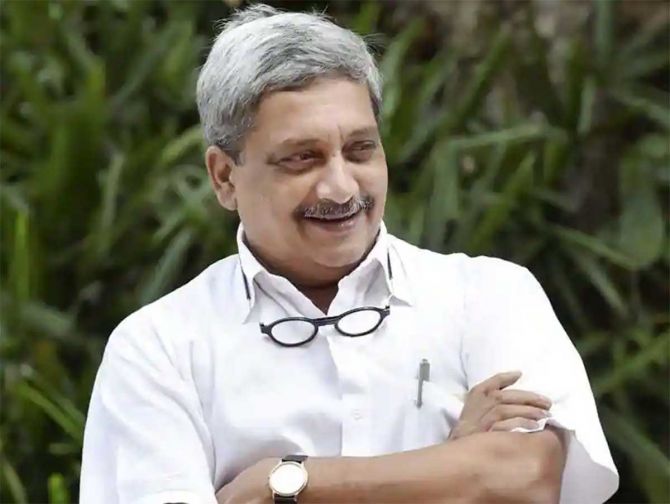
His biggest contribution was to break the Rafale logjam. For six years, India had been unable to decide on how to buy the French-made combat jets because of the faulty procedure adopted by the MoD under the then defence minister A K Antony.
It is to Parrikar's credit that he decided to think differently on a knotty issue and suggested a way out to the prime minister. In fact, in less than six months after taking over, Parrikar has studied various complex issues dogging the defence ministry and had come to his own conclusions on what needed to be done.
By his own admission, Parrikar spent the first four months as defence minister in taking inputs from a range of experts both within and outside the MoD before making up his mind.
In his review, Parrikar also found that the bureaucracy in the ministry -- both civil and military -- was sitting on some 400-odd big and small projects that were critical to the three armed forces.
Without getting into details, he said: 'The first thing I did was to look at projects that are stuck at various stages of clearances, since the most common complaint across the board was "nothing moves" in the MoD.'
A thorough review revealed that nearly one-third of the 400-odd projects were now irrelevant. So they were discarded. About 50 projects were accelerated since they were of critical importance.
A decade-long impasse in defence acquisitions was broken with the decision on Rafale, raising renewed hope in the sector. Parrikar brought in a sense of purpose in the notoriously obdurate MoD bureaucracy.
'There was no control over the system. There were no reviews, no feedback and there was no fear of punishment for non-performance. An important ministry like Defence cannot run like this,' Parrikar had told me.
However, it was Parrikar's sharp insights into finance and international systems that stood out when India -- at his suggestion -- decided to procure the Rafale combat jets from France.
A detailed background is necessary here to understand the complexity of the process that had gotten bogged down in procedures and flawed approach right from the beginning.
**
Even as talks got deadlocked, the government changed in Delhi.
As the new political leadership was briefed about the impasse, MoD officials were told to try and break the deadlock as soon as possible, since the IAF's fleet of fighter aircraft was depleting alarmingly.
So, during a meeting of CNC on 25 September 2014, Dassault Aviation was told to provide commitment on these two issues within 10 days. The company demurred. As no response was received, they were again requested vide letter dated 31 October 2014 that the requisite commitment may be provided within a week. In their response dated 7 November 2014, Dassault Aviation did not provide the confirmations sought by the CNC.
On 10 November 2014, meanwhile, Parrikar took over as defence minister. While being briefed about the major pending projects and contracts, he realised that the MMRCA contract wasn't going anywhere. He still wanted to give the French sufficient time to comply with the terms of the tender.
In December 2014, the French defence minister came visiting and as expected, raised the issue of conclusion of contract negotiations in the MMRCA case with Parrikar who told him that conclusion of the contract was held up on account of the vendor not confirming compliance to the terms of the RFP.
This was followed up by a formal letter from Parrikar to the French defence minister stating that it would be really useful for Dassault Aviation to confirm compliance to the terms of the RFP and the terms of the bid submitted by them at the earliest.
It was further mentioned in the letter that the negotiations could be carried forward and concluded thereafter if Dassault Aviation could be asked to depute a fully empowered representative to discuss non-stop with the CNC.

Another discussion with the delegation of Dassault Aviation was held on 12 February 2015. A clarification was sought from Dassault Aviation towards confirmation of compliance to the terms of the RFP and terms of the bid submitted by them specifically.
The two crucial points, i. the consolidated man hours based on which Dassault Aviation had been declared L-1 would be the same man hours required for license manufacture of 108 Rafale aircraft in India, and ii. Dassault Aviation as the seller under the contract for 126 aircraft for the IAF would undertake necessary contractual obligations as per RFP requirements.
The representatives of Dassault Aviation reiterated their stand on both issues and stated that while Dassault Aviation would be responsible only for delivery of 18 aircraft in a flyaway condition, they would not take ownership for the 108 aircraft to be manufactured by HAL as the Local Production Agency (LPA).
On the issue regarding man hours, the Dassault Aviation representative stated that the company's stand had always been consistent that the man hours indicated in their proposal correspond to the related tasks performed in French industrial condition.
He also mentioned that only HAL being the Lead Production Agency could talk about the factor of multiplication to be applied to these man hours to convert the same to the man hours required for license production of 108 aircraft in India.
Clearly, Dassault Aviation was using the loophole in the original terms of the tender to get away with shirking its responsibility towards the quality of the 108 jets to be manufactured in India.
Exasperated at the obduracy shown by the French company, the MoD issued an ultimatum on 20 March 2015 asking it to fulfill the commitment and confirmation on the two aspects mentioned above, 'failing which MoD may be constrained to withdraw the RFP issued'.
However, Dassault Aviation, in its response dated 24 March 2015, did not commit on the two aspects mentioned above. Instead, the French company stated that the estimate of consolidated man hours given by them was to be used by HAL to prepare its own quotation with respect to the completion of its (HAL's) tasks under the MMRCA.
The MoD realised that applying a factor of 2.7 on the man hours quoted by both Dassault Aviation and EADS (the company that quoted the second lowest price), the Total Cost of Acquisition (TCA), as on November 2011, would undergo a material change to the extent that Dassault Aviation would have no longer remained L-1 vendor and would have become L-2 vendor.

As members of the cost negotiating committee on Rafale took the matter to Parrikar, he realised the process had been convoluted to such an extent that it would have been impossible to take it forward. He, however, knew from the briefings given by the IAF that there was no time to lose in acquiring fighter jets.
The number of effective squadrons was going down rapidly. The IAF leadership also told him that they were happy with Rafale's performance and would rather have the fighter in its fleet than scout for other options.
Parrikar realised that another prolonged competition would have taken enormous time and effort. So he took the matter to the prime minister and briefed him about the necessity of procuring the fighter aircraft.
At the same time, Parrikar told Modi it would be legally untenable to go through with the original competitive process since it had got vitiated completely, thanks to Antony's indecisiveness and a crucial oversight in the original terms of the contract.
Under the circumstances, there was no alternative but to withdraw the original tender, Parrikar told Modi since the Central Vigilance Commission guidelines provided that negotiations could not be held with the competitor who had come second in the competition (L-2 vendor in officialese).
The only way, the defence minister suggested, was to scrap the tender and buy a minimum number of Rafale jets off the shelf to fill a critical gap in the IAF's inventory.
The prime minister agreed and decided to talk to the French president about such a possibility during his upcoming visit to Paris, in April 2015. The Cabinet Committee on Security also gave its approval to the new proposal before Modi left for Paris, on 9 April 2015.
That evening, alerted by a source about the possibility of India scrapping the original tender and going in for off-theshelf purchase of Rafale jets, I scooped the story on my blog News Warrior (www.nitinagokhale.blogspot.in), 10 minutes before midnight on 9 April, almost 22 hours before Modi's announcement of India deciding to buy Rafale jets off-theshelf was made in Paris. I, however, got the numbers wrong. My report said India would buy 63 Rafale directly from Dassault Aviation.

Eventually, Prime Minister Modi announced in Paris that India would purchase 36 aircraft. India's decision, announced at a joint press conference between Modi and the then French president Francoise Hollande on 10 April 2015, took everyone by surprise but under the circumstances, the prime minister had chosen the best possible solution.
Once the in-principle decision was taken, it was left to Parrikar and his team in the MoD to negotiate the eventual price for buying the 36 jets. Their confidence bolstered by the PMO, the Parrikar-led MoD drove a hard bargain with the French.
But it wasn't until another 15 months later -- in September 2016 -- that India finally signed the contract and got the state-of-the-art fighters at a competitive price. 'I must give full credit to the negotiating team for having diligently worked out all details to get a good bargain and the prime minister's total trust in us,' Parrikar had remarked to me.
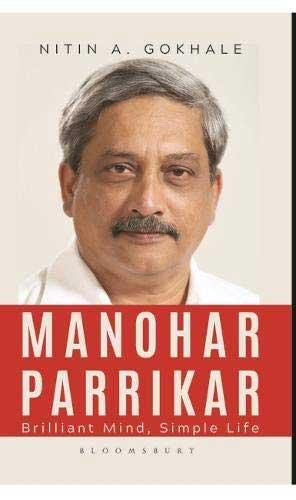
What he didn't mention, however, is his own steadfast belief that the cost had to be negotiated to India's advantage.
Recalls a senior IAF official involved in the hard bargain with the French: 'It was Mr Parrikar who backed us to the hilt and even held firm in the face of tremendous pressure applied by the French when their president [Francois Hollande] was in Delhi as the chief guest for the Republic Day Parade in January 2016.'
Mr Hollande was keen to sign the MoU, inclusive of the finalised price, with our prime minister while in Delhi. We negotiated through the night until 4 am but the price Mr Parrikar thought was still high.'
'So he took the matter to the PM and requested him to sign the MoU without mentioning the final price, which Modi promptly did.'
So on 26 January 2016, India and France signed a MoU for India to buy 36 Rafale fighter jets. Newspaper reports the next day said the 9 billion dollars deal would take some time to be finalised. It took another eight months for the contract to be signed. The team drove a hard bargain and obtained a hefty discount.
Excerpted from Manohar Parrikar: Brilliant Mind, Simple Life by Nitin A Gokhale, with the permission of the publishers, Bloomsbury India.
Feature Presentation: Ashish Narsale/Rediff.com

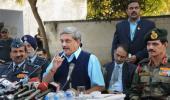



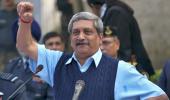



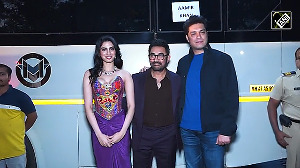

 © 2025
© 2025